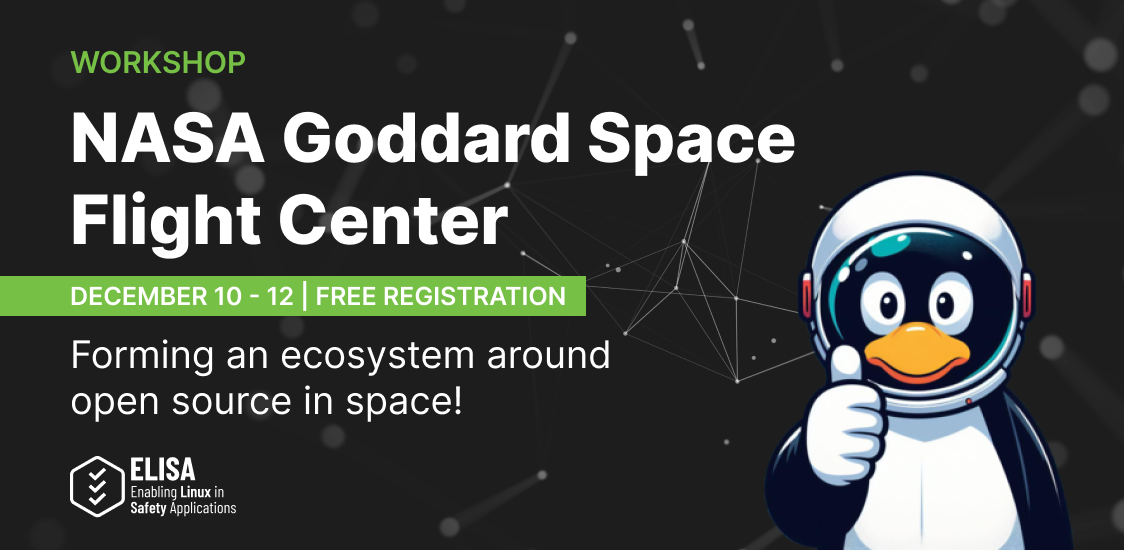
The ELISA Project is hosting its next workshop on December 10-12 at the NASA Goddard Space Flight Center in Greenbelt, Maryland. This event, which is free to attend and open to any interested participants, will provide more details about the formation of a new Space Grade Linux Special Interest Group (SIG).
The Space Grade Linux SIG will address the challenges of space, which often includes a long lifespan for robotic or human-based missions. From development to deployment there are multiple considerations that need to be considered. This new SIG is the initial step towards creating an ecosystem of supported platforms and a collaborative community. Hosted under the ELISA Project, the Space Grade Linux SIG is currently seeking feedback about Linux in Space in a survey and recruiting more members. Click here to provide your feedback.
With NASA’s leadership in this area, the three-day workshop is designed to facilitate an exchange of ideas and hands-on collaboration that will drive the future of Linux systems in space-grade applications. Speakers inlcude representatives from ELISA Project member companies including Boeing, Red Hat and Bosch as well as NASA, CesiumAstro, TelePIX, the Linux Foundation and more. Attendees will engage in a series of panel discussions, and presentations focused on the unique challenges and opportunities of deploying Linux in space environments, including considerations for safety, reliability, and sustainability.
Workshop Topics and Speakers include:
- The ELISA Systems Working Group – is it ready for space? – Philipp Ahmann, ETAS
- Lessons from Automotive Grade Linux – Walt Miner, The Linux Foundation
- Linking external test results to test cases in BASIL to support preexisting test infrastructure – Luigi Pellecchia, Red Hat
- How to use ks-nav for a feasible and meaningful test campaign in the kernel – Alessandro Carminati, Red Hat
- Space Grade Linux interest survey results – Ramon Roche, Dronecode Foundation, and Kate Stewart, The Linux Foundation
- Verification and validation of the OS and “certification package” – Scott Tashakkor, NASA
- Test and assurance of non-volatile memory devices for space – Ted Wilcox, NASA
- Addressing security topics for future space systems using Linux – Joshua Krage, NASA
- Linux Kernel design documentation – Gab Paoloni, Red Hat; Kate Stewart, The Linux Foundation; and Chuck Wolber, Boeing
- Space ROS – Matt Hansen, Space ROS maintainer
- cFS overview – Richard Landau, NASA; and Ashok Prajapati, NASA
- Deploying NASA cFS with Yocto – Mark Senofsky, CesiumAstro
- Investigating implementation of Linux-based payload computers: a review of in-orbit demonstrations for Edge AI in space missions – Dongshik Won, TelePIX Co., Ltd.
- Container and immutable patterns for operating systems and wordloads – Michael Epley, Red Hat
- Containerization in space: Podman for mission-critical operations and resilience – Douglas Schilling and Dan Wash, Red Hat
- Real Time Linux update – Steve Rostedt, Google
- Linux in automotive on safety applications – Naresh Ravuri, Magma Electronics
You can find the complete schedule here. Register for the workshop here.
This event represents a significant step toward making Linux a trusted, robust platform for safety-critical applications. As part of the ELISA Project’s mission, this workshop aims to foster the development of open source solutions that meet the rigorous demands of aerospace, driving innovation that will ultimately benefit a variety of safety-critical fields.
If interested participants are unable to join the workshop, ELISA Project encourages participation through joining the mail list or formation calls. Learn more here.